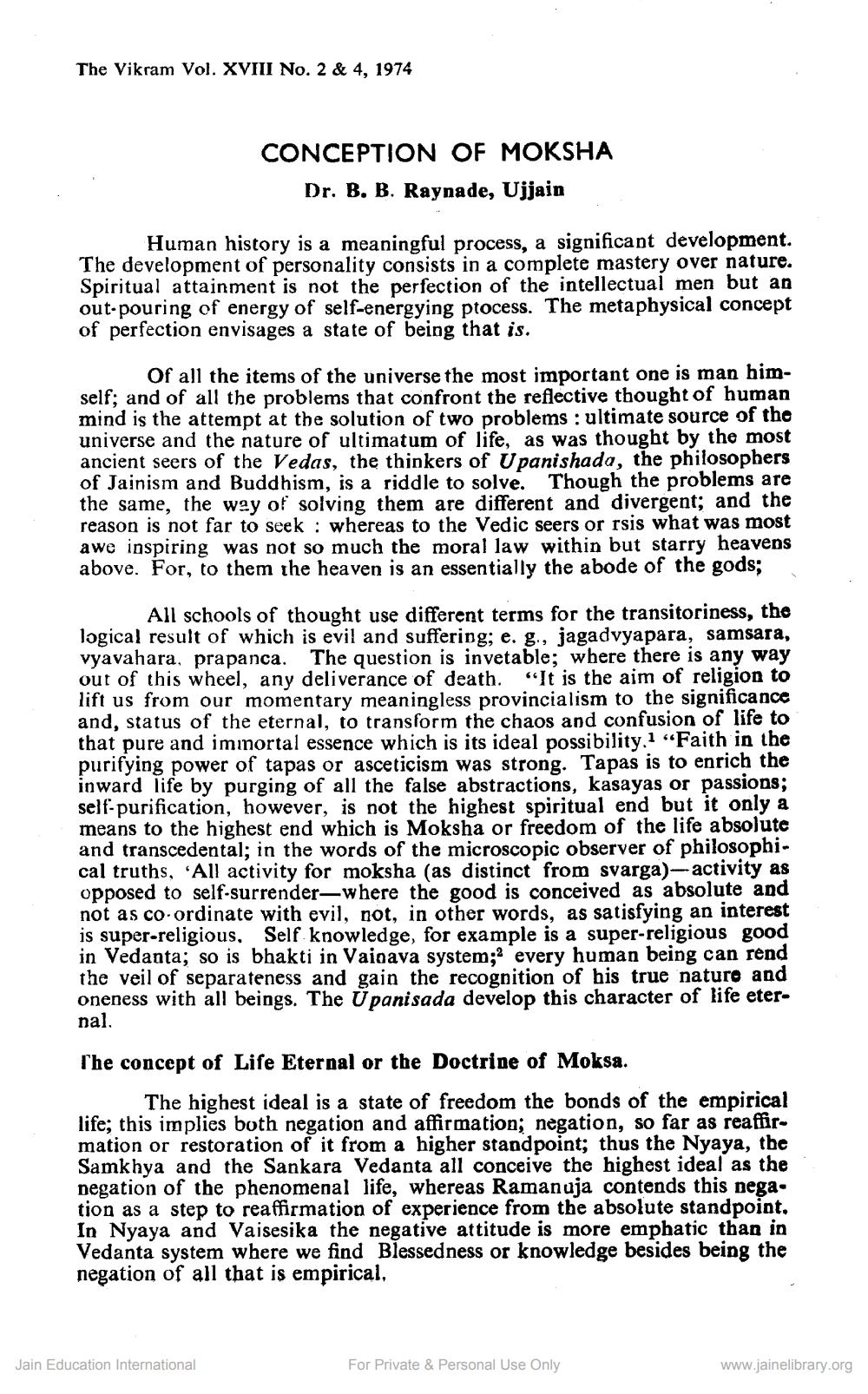________________
The Vikram Vol. XVIII No. 2 & 4, 1974
CONCEPTION OF MOKSHA
Dr. B. B. Raynade, Ujjain
Human history is a meaningful process, a significant development. The development of personality consists in a complete mastery over nature. Spiritual attainment is not the perfection of the intellectual men but an out-pouring of energy of self-energying ptocess. The metaphysical concept of perfection envisages a state of being that is.
Of all the items of the universe the most important one is man himself; and of all the problems that confront the reflective thought of human mind is the attempt at the solution of two problems : ultimate source of the universe and the nature of ultimatum of life, as was thought by the most ancient seers of the Vedas, the thinkers of Upanishada, the philosophers of Jainism and Buddhism, is a riddle to solve. Though the problems are the same, the way of solving them are different and divergent; and the reason is not far to seek : whereas to the Vedic seers or rsis what was most awe inspiring was not so much the moral law within but starry heavens above. For, to them the heaven is an essentially the abode of the gods;
All schools of thought use different terms for the transitoriness, the logical result of which is evil and suffering; e. g., jagadvyapara, samsara, vyavahara, prapanca. The question is in vetable; where there is any way out of this wheel, any deliverance of death. “It is the aim of religion to lift us from our momentary meaningless provincialism to the significance and, status of the eternal, to transform the chaos and confusion of life to that pure and iminortal essence which is its ideal possibility. 1 "Faith in the purifying power of tapas or asceticism was strong. Tapas is to enrich the inward life by purging of all the false abstractions, kasayas or passions; self-purification, however, is not the highest spiritual end but it only a means to the highest end which is Moksha or freedom of the life absolute and transcedental; in the words of the microscopic observer of philosophical truths, All activity for moksha (as distinct from svarga)- activity as opposed to self-surrender—where the good is conceived as absolute and not as co-ordinate with evil, not, in other words, as satisfying an interest is super-religious, Self knowledge, for example is a super-religious good in Vedanta; so is bhakti in Vaioava system; every human being can rend the veil of separateness and gain the recognition of his true nature and oneness with all beings. The Upanisada develop this character of life eternal.
The concept of Life Eternal or the Doctrine of Moksa.
The highest ideal is a state of freedom the bonds of the empirical life; this implies both negation and affirmation; negation, so far as reaffirmation or restoration of it from a higher standpoint; thus the Nyaya, the Samkhya and the Sankara Vedanta all conceive the highest ideal as the negation of the phenomenal life, whereas Ramanuja contends this nega. tion as a step to reaffirmation of experience from the absolute standpoint, In Nyaya and Vaisesika the negative attitude is more emphatic than in Vedanta system where we find Blessedness or knowledge besides being the negation of all that is empirical,
Jain Education International
For Private & Personal Use Only
www.jainelibrary.org




